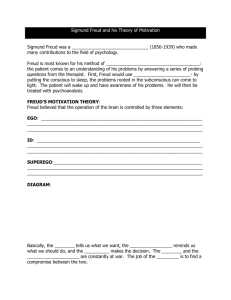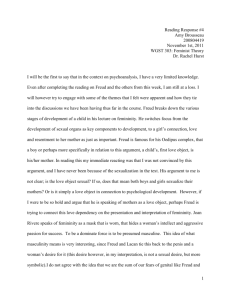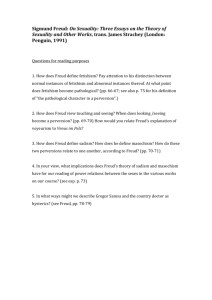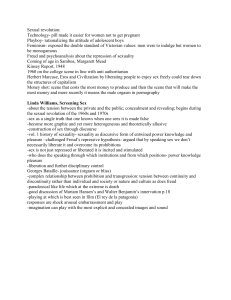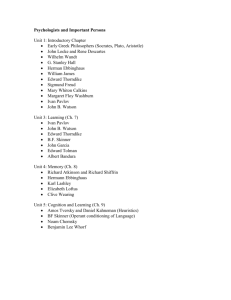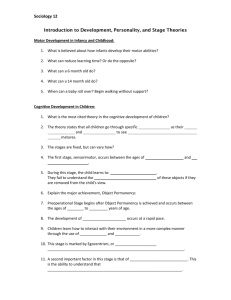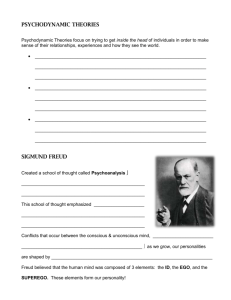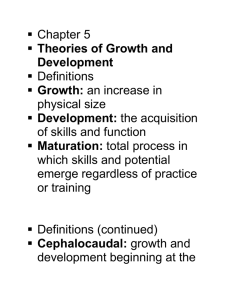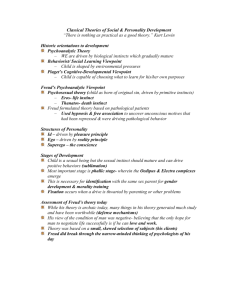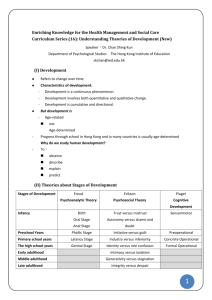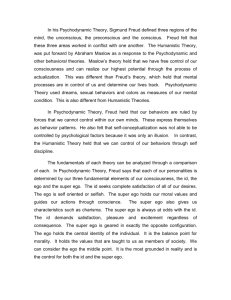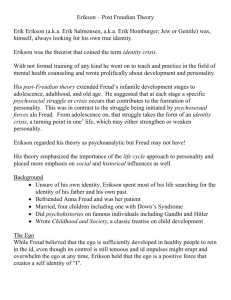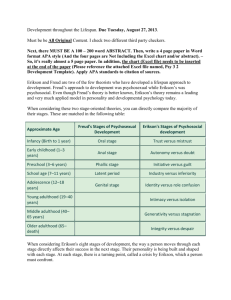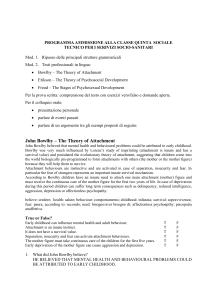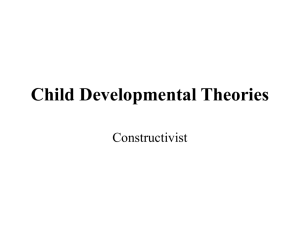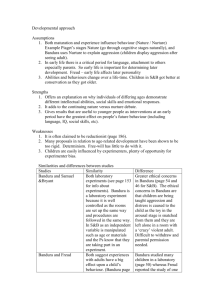Q: III: Freud`s theory
advertisement
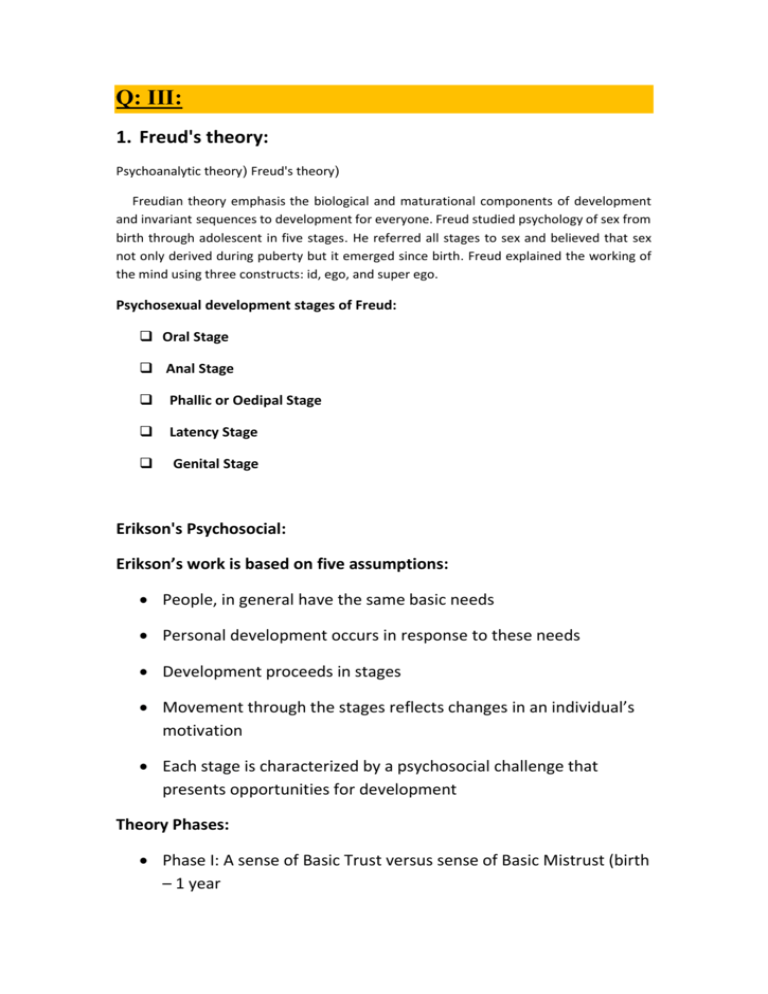
Q: III: 1. Freud's theory: Psychoanalytic theory( Freud's theory( Freudian theory emphasis the biological and maturational components of development and invariant sequences to development for everyone. Freud studied psychology of sex from birth through adolescent in five stages. He referred all stages to sex and believed that sex not only derived during puberty but it emerged since birth. Freud explained the working of the mind using three constructs: id, ego, and super ego. Psychosexual development stages of Freud: Oral Stage Anal Stage Phallic or Oedipal Stage Latency Stage Genital Stage Erikson's Psychosocial: Erikson’s work is based on five assumptions: People, in general have the same basic needs Personal development occurs in response to these needs Development proceeds in stages Movement through the stages reflects changes in an individual’s motivation Each stage is characterized by a psychosocial challenge that presents opportunities for development Theory Phases: Phase I: A sense of Basic Trust versus sense of Basic Mistrust (birth – 1 year Phase II: A sense Autonomy versus sense of Shame and Doubt (1-3 years) Phase III: A sense of Initiative versus sense of Guilt (3-5 years) Phase IV: A sense of Industry versus Inferiority and Inadequacy (612 years) Phase V: A sense of Identity versus Identity Diffusion (12-20 years) 2. Theoretical background of conduct disorders: – Chronic pattern of behavior that causes harm to others – Chronic pattern of behavior that violates societal rules Examples: – Aggression to people and animals (e.g., bullying, threatening, fighting, using a weapon) – Serious violations of rules (e.g., running away, truancy تهرب من المدرسة, staying out at night without permission) Characteristics: • • • Behavioral manifestations: – Aggression – Defiance تحد او نكاية Dimensions – Severity – Frequency – Intensity Treatment : – Parent management training – Problem solving skills training – Multi-systemic therapy 3. Characteristics of autism: Communication/Language: Delayed language and Echolalia 50% of autistic individuals will eventually have useful speech Social Interaction: One of hallmarks of autism is lack of social interaction Behaviors: Repetitive behaviors, including obsessions, tics, and perseveration Impeding behaviors (impede their learning or the learning of others) Will need positive behavior supports Self-injurious behavior Aggression Sensory and movement disorders: Abnormal posture and movements of the face, head, trunk, and limbs Abnormal eye movements Resistance to change (predictability): May insist on particular furniture arrangement, food at meals, TV shows Intellectual functioning: Autism occurs in children of all levels of intelligence, from those who are gifted to those who have mental retardation In general, majority of individuals with autism are also identified as having mental retardation – 75% below 70 4. Discuss sensorimotore stage: In this period, intelligence is demonstrated through motor activity without the use of symbols. Knowledge of the world is limited (but developing) because it is based on physical interactions and experiences. Some symbolic abilities are developed at the end of this stage. 1. reflexes (0-1months) Strengthens and differentiates reflexes 2. Primary Circular Reaction (1-4 months) Circular pattern of having a stimulus and responding Focus is on own body 3. Secondary Circular Reaction (4-8 months) Focus is on the outside world 4. Coordination of Secondary Schema (8-12 months) Goal oriented behavior Apply ability to other things 5. Tertiary Circular Reaction (12-18 months) Active potential Explore object’s potential 6. Invention of New Means through Mental Combinations (18-24 months) Child moves from overt to covert thoughts The child can use mental representation instead of physical objects Q: IV: 1. Cognitive development of this girl: Concrete Operational Stage (7-11 years). Operation: internalized action part of organized structure. Mentally carried out actions Intelligence is demonstrated through logical and systematic manipulation of symbols related to concrete objects. Egocentric thought diminishes. Operational thinking develops. 2. Sense of industry: Industry is the enjoyment of mastery and competence through success and recognition of one’s accomplishment(s) This stage covers the early school years from approximately age 6 to 12. Through social interactions, children begin to develop a sense of pride in their accomplishments and abilities. Children who are encouraged and commended by parents and teachers develop a feeling of competence and belief in their skills. Those who receive little or no encouragement from parents, teachers, or peers will doubt their ability to be successful. 3. Stage 2: Looking out for: Children (age 5-10) tend to be self-serving. They lack respect for the rights of others but may give to others on the assumption that they will get as much or more in return. It is more a matter of "you scratch my back and I'll scratch yours," instead of loyalty, gratitude, or justice. Motto: "What's in it for me?" 4. Nursing role for learning disabilities: Repeat and summarize oral lecture notes and give students written versions of key points. Verbalize what is being written on the chalkboard and read aloud material contained in handouts. The nurse educate teachers to deal with children with LD: Make it easy for students to ask for repetition and bear in mind that it is important to use the same language when you do repeat Students with learning disabilities may require extra time to complete inclass and homework assignments as well as tests Don’t issue too many instructions at the same time. Break tasks down into their component parts Allow time in advance for students to think about items to be covered in class Begin each lesson with a review of what has been learned Tell students the goal of the lesson Reorganize the seating to help students by placing students with special needs near the teacher Give positive feedback when behavior is satisfactory Give feedback when behavior is not satisfactory Reassure him that you care how she/he feels Talk with student to determine prior knowledge and begin instruction at the appropriate level of understanding Target his strengths and help him shine in these areas Use multiple-choice or matching tests instead of full recall tests Keep daily parent-teacher notes Use special materials:, computer, spell check, tape recorder, electronic dictionary Use rewards to stimulate work completion Allow student choice of assignments Sit with child to initiate work Summarize what has been learned at the end of each lesson Allow sufficient practice of the concepts or skills for all students 5. How to deal with school phopia: Treatment of school phobia is depending on cause. Primary goal of treatment is to return child to school. The longer the child is permitted to stay out of school, the more difficult for the child to return. Parents must be convinced gently but firmly that immediate return is essential and that responsibility is to insist on school attendance. School reentry protocol may be necessary for children with severe symptoms. Relaxation techniques also are used. Child initially for half day and progress for full day. School Nurse provides support for parents and teacher during reentry. If the problem is persistent, professional help is recommended.



